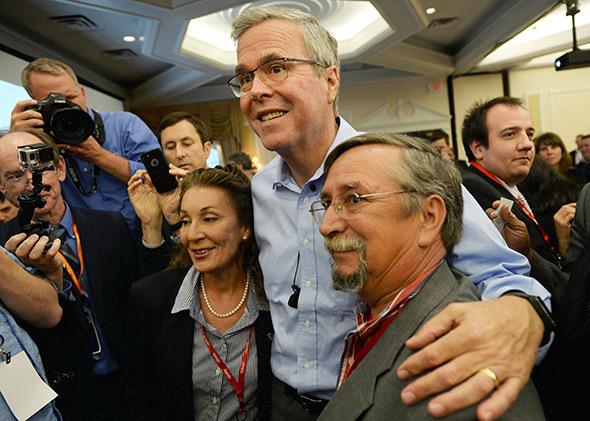In his four months as a not-quite-candidate for the Republican presidential nomination, Jeb Bush has raised stacks of cash. At a weekend meeting in Miami Beach, Florida, reports the Washington Post, the former Florida governor told 350 of his top donors that his super PAC, Right to Rise, has raised more money in its first 100 days than “any other Republican operation in modern history.” And while Bush wouldn’t specify the total, senior Republicans believe the super PAC is on track to raise $100 million by May’s end, dwarfing first-quarter totals from George W. Bush—who raised $37 million in the first four months of 1999—and Mitt Romney, who raised $23 million in the first quarter of 2007.
Jeb Bush’s total is astounding. But it also belies an important difference among him, his brother, and even Mitt Romney. In presidential politics, fundraising is as much about signaling strength as it is building resources. Dubya’s multimillion-dollar haul did more than fund a campaign: It made him the most dominant candidate in the race, dissuading some Republicans from taking the risk and shutting others—like former Tennessee Gov. Lamar Alexander—out of the competition. Build enough of this party strength, and—like George W. Bush—you can coast to the nomination sans a serious challenge. And even if you can’t, you can at least influence the caliber of your opponents. That was the case in 2011, when Romney wasn’t so strong as to be unbeatable, but he was strong enough to discourage the strongest Republicans from running in a year when—given an incumbent president—the odds weren’t especially in the GOP’s favor.
Bush has tens of millions of dollars, but he hasn’t begun to shut out the competition. Despite his frantic fundraising, three candidates have officially joined the race—Sens. Ted Cruz, Rand Paul, and Marco Rubio—and another, Wisconsin Gov. Scott Walker, is building strength and support before he makes an announcement. More importantly, both Rubio and Walker are serious alternatives to Bush; they occupy important parts of the Republican establishment and are acceptable to most party factions. They don’t have as much money as Bush, but arguably, their odds are just as good.
Other than Romney—who briefly floated a third run for the nomination—Bush’s fundraising has done little to dissuade anyone from joining the race. Yes, it is too early for anyone to drop out, but if Jeb were as intimidating as his money suggests, others may have stayed away from the contest entirely. As it stands, the opposite is true. Gov. John Kasich of Ohio is flirting with a campaign—speaking to audiences in New Hampshire, touting his Ohio accomplishments, and talking about what he might do as president—as is Gov. Rick Snyder of Michigan, who played the same coy game with an influential group of Jewish Republicans, including Sheldon Adelson, in Nevada. In fact, if you count everyone who has either declared or expressed interest, the Republican field is 18 deep, not including Bush: Walker, Rubio, Kasich, Snyder, Paul, Cruz, Mike Huckabee, Ben Carson, Rick Santorum, Chris Christie, Rick Perry, Bobby Jindal, Lindsey Graham, Carly Fiorina, Peter King, George Pataki, Jim Gilmore, and John Bolton. And while it may narrow a little when the primaries officially begin, this is roughly what the slate will look like.
There are more candidates now then there were when Jeb announced his “shock and awe” fundraising offensive at the beginning of the year, which is to say that Bush has neither shocked nor awed his competition. Despite his fame and name recognition, he’s not a titan like his brother or a leviathan like the present-day Hillary Clinton, or even a minor member of the political pantheon like Clinton in 2007; instead, he’s one hopeful among many. And while he has loads of cash, his chances aren’t appreciably better than his competitors’. Indeed, they’re probably worse: If Jeb stands out from the pack, it’s because he’s a Bush. And the Bush name is unpopular. Dismally, terribly unpopular.
